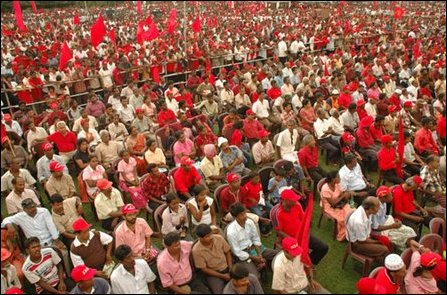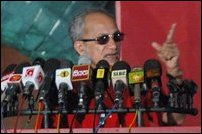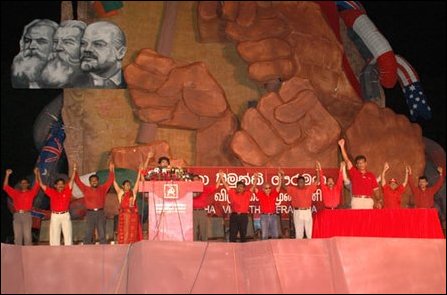nationalist Janatha Vimukthi Peramuna (JVP), which recently suffered a split, has whipped up anti-Indian sentiments in his May Day address calling for protests against what he labeled as 'Indian hegemonic foreign policy'. Stating that Sri Lankan forces 'liberated the East' not for the benefit of Indian geo-political and economic interests, but to resettle 'all ethnic communities' there, he said that the JVP would not allow separation of the country in the name of devolution proposals and proclaimed that the renewed JVP would become the locomotive of the future governance of Sri Lanka.
"The locomotive is ready, we only need to prepare cars for Sinhala, Muslim and Tamil people, to be coupled together into a train of masses," he said.
"India should keep a low profile or be ready to meet a massive campaign by the JVP against India's interventionist approach," he proclaimed in the May Day rally held at Colombo Town Hall premises Thursday.
He assailed Tissa Vitarana for attempting to design proposals for future separation of the country in the name of devolution of power.
Though the JVP spewed venom on India in the 1971, 1987 period, it managed to maintain an intimate friendship with India in recent years.
Two reasons are being attributed for JVP's recent anti-India stance: The JVP considers that India is pressurizing Colombo to present a solution to the ethnic problem through the 13th Amendment. JVP also feels that the establishment of provincial councils in the North and East is the first step towards separatism. Besides, the JVP is of the opinion that India is making use of the current turbulent circumstances to make major investments in Sri Lanka that shall directly encourage India's trade and economic domination and political expansion. In particular, the steps taken by India to keep its geopolitical interests intact in Trincomalee has increased India's influence in that port city.
JVP's anti-Indian rhetoric was one of the basic, essential doctrines of the party.
In order to capture power, the JVP took up two armed revolutions in 1971 and 1989; however, it suffered defeat in both of them. One of the fundamental tenets of these struggles was opposing India.
The JVP took secret political classes to indoctrinate the young men and women to prepare them for the armed revolution. Five secret lessons were taught during these classes, and "Indian expansionism" was one of the topics lectured upon. These lectures specially examined India's external affairs policy on the assumption that the Indian policy towards Sri Lanka was designed to dominate Sri Lanka; therefore these lectures dealt on how to tackle this. This has resulted in developing a deep-seated fear of India among the Sinhalese people.
Following the 1987 Indo-Sri Lankan Accord, Indian forces established themselves in the North and East, JVP made use of the India-phobia to accelerate its struggle. However, when India pulled out its troops and maintained silence, JVP also diluted its anti-India position.
When Norway engaged itself in a serious effort to facilitate and find a solution to the conflict, JVP opposed Norway's interference and maintained that only India could qualify as a mediator to the problem, assuming that India's anti-Tiger stand would ensure that any solution put forward by India would certainly appease Sinhalese hardliners.
Yet, the JVP's current struggle arises out of its suspicion that India is presently pushing the 13th Amendment.
If India continues its pressurizing and coercive tactics, JVP shall call upon the people of Sri Lanka to boycott Indian products to register their protest, the JVP leader has told media recently. "To face new situations, the JVP shall plan new strategies," Somawansa said in an interview.
JVP's president has also gone on record criticizing India's decision to help Sri Lanka to establish a thermal power plant at Trincomalee describing the move as part of India's 'expansionist political agenda'.
Friday, 2 May 2008
Subscribe to:
Post Comments (Atom)





No comments:
Post a Comment